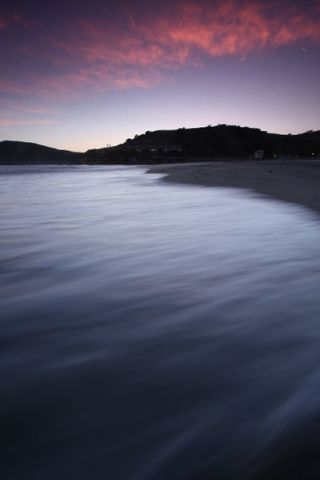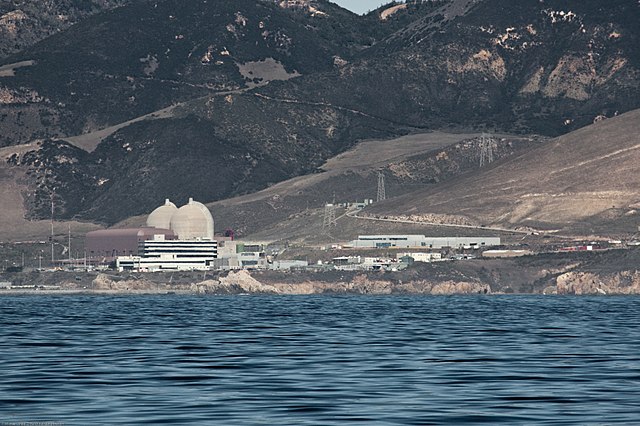Avila Beach, California
Place in California, United States From Wikipedia, the free encyclopedia
Place in California, United States From Wikipedia, the free encyclopedia
Avila Beach (Spanish: Ávila) is an unincorporated community in San Luis Obispo County, California, United States,[4] located on San Luis Obispo Bay[5] about 160 miles (257 km) northwest of Los Angeles, and about 200 miles (320 km) south of San Francisco. The population was 1,576 at the 2010 census. For statistical purposes, the United States Census Bureau has defined Avila Beach as a census-designated place (CDP).[2]
Avila Beach, California | |
|---|---|
 Avila Beach, with Point San Luis at left | |
 Location of Avila Beach in San Luis Obispo County, California. | |
| Coordinates: 35°10′50.1″N 120°43′55.1″W | |
| Country | |
| State | |
| County | San Luis Obispo |
| Area | |
| • Total | 6.31 sq mi (16.34 km2) |
| • Land | 6.09 sq mi (15.77 km2) |
| • Water | 0.22 sq mi (0.58 km2) 0.29% |
| Elevation | 430 ft (130 m) |
| Population (2020) | |
| • Total | 1,576 |
| • Density | 258.91/sq mi (99.96/km2) |
| Time zone | UTC-8 (Pacific (PST)) |
| • Summer (DST) | UTC-7 (PDT) |
| ZIP codes | 93424 |
| Area code | 805 |
| FIPS code | 06-03330 |
| GNIS feature ID | 2582937 |



The name Avila commemorates Miguel Ávila, who was granted Rancho San Miguelito in 1842.[4][6] The town was established in the latter half of the 19th century, when it served as the main shipping port for San Luis Obispo. Around this time, Luigi Marre built a honeymoon hotel here and steamboats brought customers from San Francisco and Los Angeles.[7]
Although Avila Beach still has a working commercial fishing pier and the inland areas have extensive apple orchards, tourism is now the main industry. There are few historical structures remaining; among the oldest is the Point San Luis Lighthouse, built in 1890 after a series of shipping accidents. During World War II the beach and port were used for Amphibious Training Base Morro Bay.[8]
In the late 1990s, Unocal began the cleanup of decades old oil seepage discovered years earlier from corroding pipes under the township, and which had caused a massive oil spill under the town.[9] Over 6,750 truckloads of contaminated material was sent to a Bakersfield landfill, and replaced with clean Guadalupe Dunes sand.[10] Many of the town's homes and businesses, including several blocks of Front Street, were razed as a result of the quarter-mile-wide excavation. New buildings, homes, businesses, modern walkways and sea motif walls and benches have been constructed.[11]
The main development in Avila Beach centers around the few blocks adjacent to the main beach. Restaurants, bars and shops line three blocks of Front Street. Homes, hotels, and small businesses are nearby. There are a few upscale housing developments inland near a golf course. Avila Beach is also known for its hot springs, which are used for resort spas.
San Luis Obispo Creek, which has a watershed of much of the San Luis Obispo area, drains into the sea just west of downtown via a lagoon. Due to some agricultural runoff, it is not recommended for swimming or wading.
According to the United States Census Bureau, the CDP covers an area of 6.0 square miles (15.6 km2), 99.71% of it land, and 0.29% of it water.
The main beach of the town, Avila Beach is less than 0.5 miles (0.8 km) long and sheltered in San Luis Bay, which is formed by Point San Luis on the west and Fossil Point on the east. Avila Beach faces south and the 600 foot elevation of Point San Luis breaks the prevailing northwesterly winds. It is therefore usually warmer than the other beaches on the Central Coast.
To the west of the Cal Poly SLO pier, the Olde Port Beach is dog friendly. Given its proximity to the port, this beach is not as good for water sports as the main town beach.[12]
Further to the west, nearest the port is the small Fisherman's Beach.
The area has three well developed trails. The Bob Jones trail connects the Avila Beach Golf Resort on the west to a trailhead on the east near Highway 101. The three mile trail follows an old railroad right-of-way. It is a part of a planned future trail connecting to San Luis Obispo.[13]
The Shell Beach Bluff Trail connects a trailhead at the end of Cave Landing Road to Smuggler's Cave to the south, Pirate's Cove Beach in the middle, and to Bluff Drive in the Shell Beach neighborhood of Pismo Beach to the east. There is a nice view of the town to be found by looking through the Smuggler's Cave.[14]
The Pecho Coast Trail connects the Port San Luis to the Point San Luis Lighthouse. The trail's starting point is near the corner of Diablo Canyon Road and Avila Beach Drive. A docent is required for this hike.[15]
Average temperatures vary little during the year, ranging from 47–49 °F (8–9 °C) to 70–72 °F (21–22 °C) from November through April, and from 60–69 °F (16–21 °C) to 80–82 °F (27–28 °C) from May through October. Average annual rainfall is 15 inches (380 mm). Along with much of the California coast, winter is the wet season, with more than 70% of the yearly rain falling from December through March, while summer brings drought conditions.
The 2010 United States census[32] reported that Avila Beach had a population of 1,627. The population density was 269.9 inhabitants per square mile (104.2/km2). The racial makeup of Avila Beach was 1,507 (92.6%) White, 13 (0.8%) African American, 7 (0.4%) Native American, 33 (2.0%) Asian, 0 (0.0%) Pacific Islander, 34 (2.1%) from other races, and 33 (2.0%) from two or more races. Hispanic or Latino of any race were 111 persons (6.8%).
The Census reported that 1,627 people (100% of the population) lived in households, 0 (0%) lived in non-institutionalized group quarters, and 0 (0%) were institutionalized.
There were 842 households, out of which 115 (13.7%) had children under the age of 18 living in them, 416 (49.4%) were opposite-sex married couples living together, 39 (4.6%) had a female householder with no husband present, 16 (1.9%) had a male householder with no wife present. There were 36 (4.3%) unmarried opposite-sex partnerships, and 14 (1.7%) same-sex married couples or partnerships. 296 households (35.2%) were made up of individuals, and 108 (12.8%) had someone living alone who was 65 years of age or older. The average household size was 1.93. There were 471 families (55.9% of all households); the average family size was 2.45.
The population was spread out, with 183 people (11.2%) under the age of 18, 74 people (4.5%) aged 18 to 24, 263 people (16.2%) aged 25 to 44, 597 people (36.7%) aged 45 to 64, and 510 people (31.3%) who were 65 years of age or older. The median age was 56.9 years. For every 100 females, there were 91.4 males. For every 100 females age 18 and over, there were 92.0 males.
There were 1,093 housing units at an average density of 181.3 per square mile (70.0/km2), of which 529 (62.8%) were owner-occupied, and 313 (37.2%) were occupied by renters. The homeowner vacancy rate was 3.1%; the rental vacancy rate was 7.4%. 1,074 people (66.0% of the population) lived in owner-occupied housing units and 553 people (34.0%) lived in rental housing units.

Avila Beach and adjacent Port San Luis have three piers. The pier that is farthest east is the Avila Beach Pier, 1,685 feet (514 m) in length, which has been closed since 2015 due to structural engineering considerations.[33] The middle pier is the California Polytechnic State University (Cal Poly SLO) Pier, part of the university's marine research program, is not publicly accessible. The westernmost pier is the Harford Pier, which is for commercial fishing boats to offload their wares since 1873.[34]
The Harford Pier has become a site for whale watching as numbers of grays and humpback whales come into the bay around the pier to feed and draw crowds during the seasons.[35]
Diablo Canyon Power Plant, the last remaining nuclear power plant in California, is located in a remote area, about 6 miles (9.7 km) northwest of the beach. The access road to the plant is located near the Harford Pier.[36][37]
The Avila Beach Pier was featured in a Super Bowl advertisement on February 7, 2010.[38]
Avila Beach was the primary shooting location for the 1979 film California Dreaming, which starred Dennis Christopher, Glynnis O'Connor, and Seymour Cassel.[39][40]
Seamless Wikipedia browsing. On steroids.
Every time you click a link to Wikipedia, Wiktionary or Wikiquote in your browser's search results, it will show the modern Wikiwand interface.
Wikiwand extension is a five stars, simple, with minimum permission required to keep your browsing private, safe and transparent.